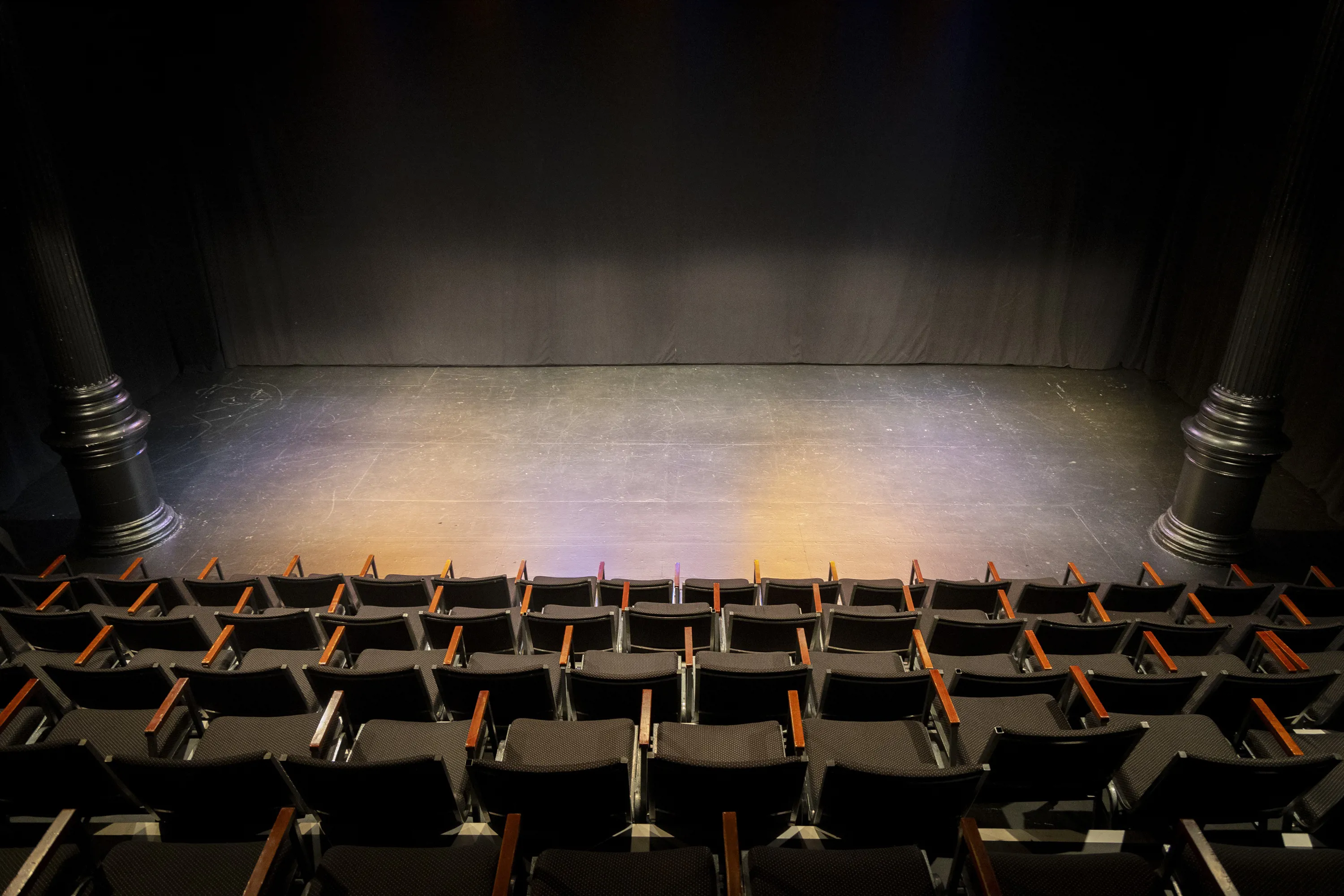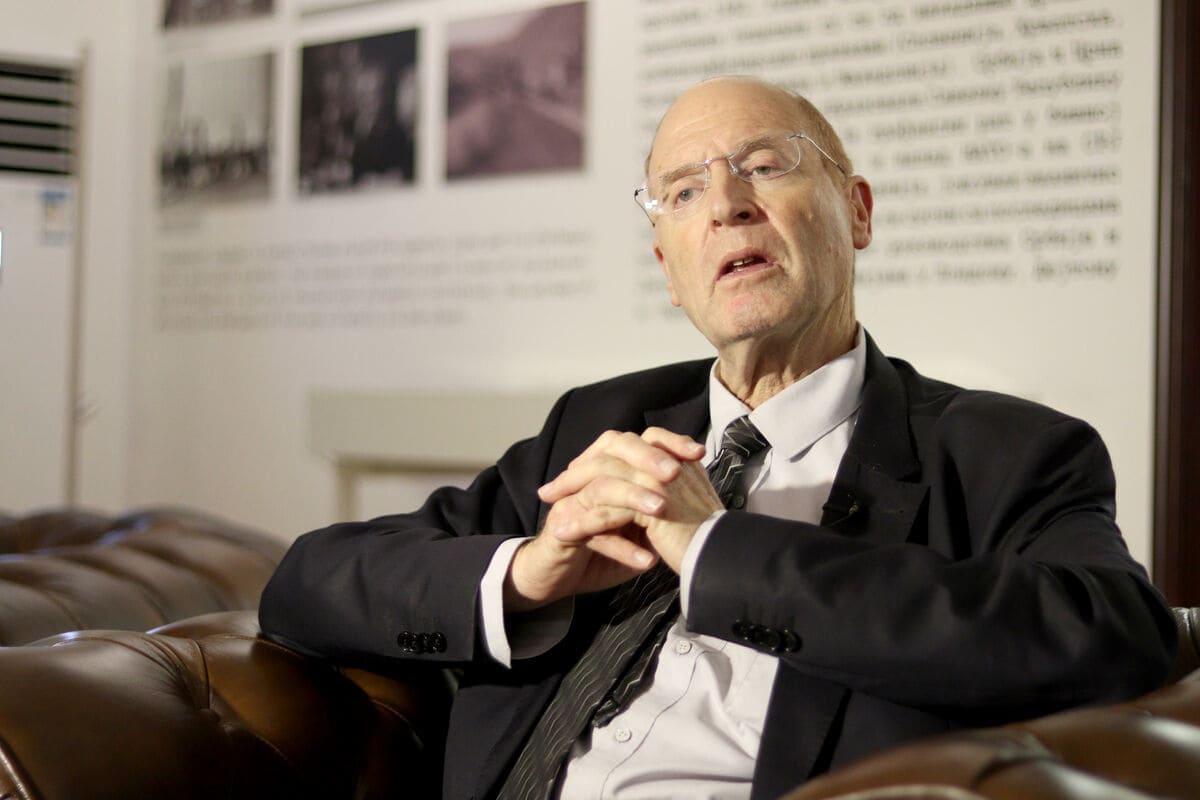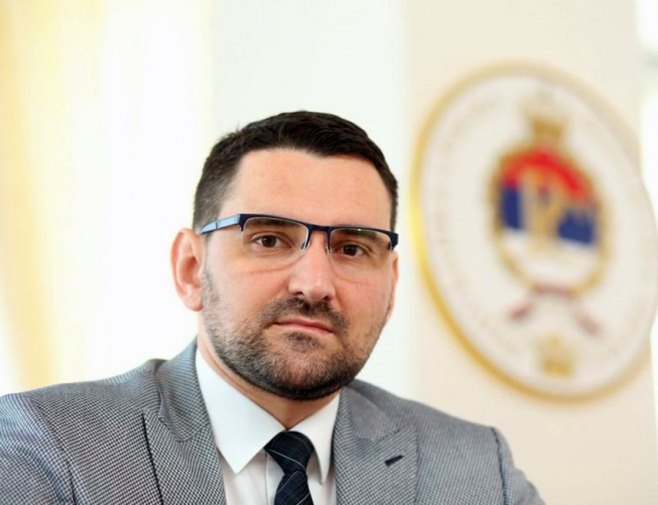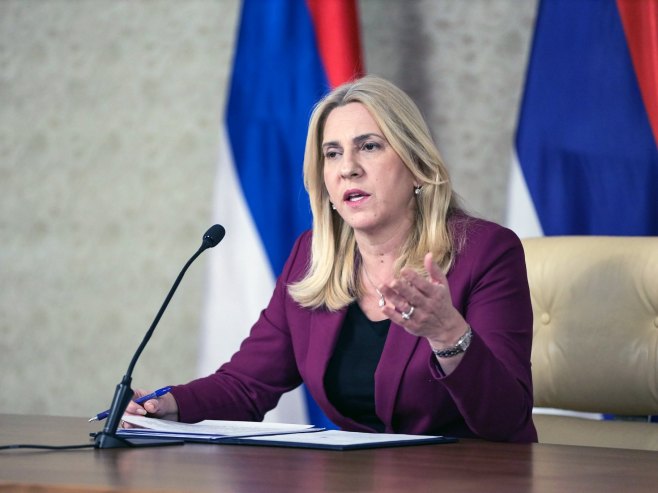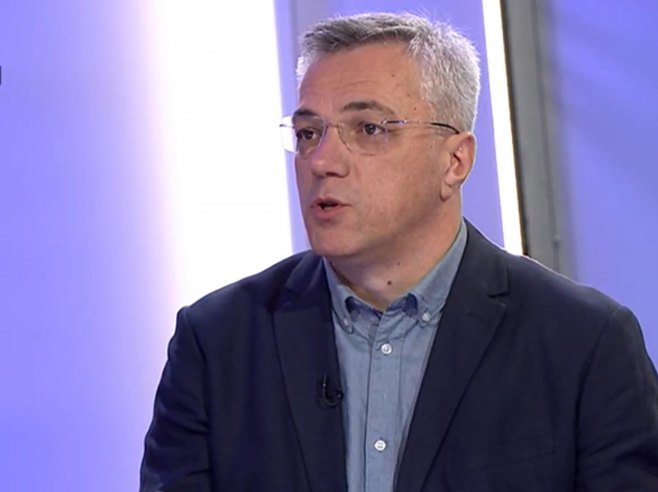Gideon Greif, president of the Independent Commission for the Investigation of the Suffering of All Peoples in the Srebrenica Region from 1992 to 1995, stated that the events in Srebrenica cannot be defined as genocide, and that one cannot play with this term, as adopting a resolution on Srebrenica would be an attempt to rewrite history.
“We, the members of the Commission, condemn this initiative to pass a resolution in the UN. It will have a very negative effect. And we warn: do not do this. It is dangerous. After so many years of bloodshed, people deserve to live in peace, which is what he wants too,” Greif emphasized in an interview with RTRS.
He welcomed the adoption of the report in the National Assembly of Republika Srpska.
“On the other hand, I have fully criticized the initiative to bring this issue before the United Nations, as it is a distortion of reality. One should never agree to a distortion of reality. This is a distortion. This is an attempt to rewrite history, to distort history. It will never happen, and we, the members of the commission, will fight against it as much as we can,” Greif highlighted.
He doubts that UN Assembly members even know what happened in Srebrenica and the area between 1992 and 1995.
“If you asked them, I truly doubt they would know what occurred there. It is a political attempt to change history, to reshape history, to influence the public with false facts, and we cannot accept that,” Greif stated.
He pointed out that they are a unique group of ten top experts, who have their own voice and are absolutely against it.
“Not to mention all these hostile and negative forces in the environment. You know the answer, and the viewers of our program know better who is behind this. These negative forces will destroy goodwill, they will destroy reconciliation, and this will lead to nothing positive, only negative. As I said, based on ignorance, even on foolishness, I would say, they will support a resolution that is absolutely biased, unrealistic, and dangerous, and we are absolutely against it,” says Greif.
He underlines that one cannot play with this term.
“You cannot play with this. It is a scientific term. Raphael Lemkin would turn in his grave if he heard that Srebrenica is defined as genocide. He would say, they are crazy. This is not the case. I did not mean such a genocide. Genocide is something else. Yes, it is dangerous and for the sacred memory of the Jewish Holocaust, in which six million Jews were brutally killed by the German Nazis, to Rwanda and other true cases of genocide. Unfortunately, we live in a world where people are killed. It is a sad fact. I do not know if we can ever stop doing this. It is in human nature,” Greifemphasized for RTRS.
He says this can destroy the memory of the Holocaust.
“What Nazi Germany did to the Jewish people between 1933 and 1945 can destroy the memory of Rwanda and other true genocides, which, unfortunately, really happened on this planet. What happened in Srebrenica in July 1995, I am sorry, cannot be defined as genocide. It cannot, it cannot, it cannot. There is nothing with the definition I read, total destruction of a specific group. That was not the case,” Greif notes.
Greif states that however, such false and ridiculous initiatives achieve nothing good.
“I must highlight that all members of the Commission are truly proud of the fact that the National Assembly of Republika Srpska adopted our report, which we authored, and on which we worked for two to four years. We are glad that Republika Srpska bases its policy on academic, scientific principles, established in our report, which is a scholarly work grounded in science, history, and facts, not on rumors, gossip, and politics,” Greif mentioned.
They worked, he says, with great responsibility, ethically, to be unbiased and to do no injustice to any party.
“I think we have achieved our goal. Therefore, we are proud that Republika Srpska has taken our report as it is and accepted it, because we worked professionally, ten top experts from different fields. I think we can be proud, and Republika Srpska can be proud that such a monumental work has been published, and now supported in the National Assembly. It is very important that reports and works like ours are based on scientific principles,” says Greif.
He notes that it is very simple to base opinions on unreal facts, unscientific facts.
“History is a science, and we are all scientists: historians, forensic experts, media experts, and lawyers, of course. Ten top experts, who worked for two years without any interference from the side, without any instructions from any government, without bias, without unfounded assumptions. We worked very objectively, to the extent that objectivity even exists in this world, and I think that our report will one day be considered the pinnacle of work of an international independent commission, like ours. Allow me to say what did not happen in Srebrenica,” Greif stated.
Definition of the term “genocide”
He reminds that in 1948, Raphael Lemkin coined the term “genocide,” which is defined as “the intentional destruction of a national, ethnic, racial, or religious group.”
“In genocide, there are two elements. One is physical, and the other is psychological. The destruction of a national, ethnic, racial, or religious group as such is the essential characteristic of every genocide, and that was not the case in Srebrenica. On the Serbian side, there was no intention to destroy a significant part in relation to the total population. In this tragic event, less than 0.5 percent of Bosnian Muslims were killed. Therefore, in any case, this cannot be considered or defined as genocide. Genocide is a crime of a completely different nature. The Commission wrote, and I would like to read to you, yes, although the Commission does not consider the killings around Srebrenica to be genocide, it recognizes the fact that thousands of people were killed in the most horrific way and that those responsible for the crime should be punished,” Greif explains.
He repeats that they were very clear in their report.
“Another thing I want to emphasize is that the Commission did not aim to marginalize or diminish the suffering of any people in these areas. On the contrary, the members of the Commission expressed the deepest respect for all victims from all cultural and national communities who tragically lost their lives in the devastations during this terrible civil war in Bosnia and Herzegovina. Thus, we have paid respect to all sides. The final report of the Commission should help in confronting the past, lead to the strengthening of trust and tolerance among the peoples of Bosnia and Herzegovina, and facilitate the final reconciliation and coexistence of all current and future generations,” Greif stated in an interview for RTRS.
He thinks the words speak for themselves.
“The next thing I would like to read says: The Commission hopes that after this report, concrete steps will be taken to confront the past, both by the parties in the conflict and by representatives of the international community, international organizations, and associations of war victims, and that real and genuine reconciliation will come. Therefore, we have the best intentions and look to a future based on the past, we call for peace and reconciliation, and all steps taken recently, initiatives by the United Nations and others, will not lead to this reconciliation that we so much want to achieve,” he stated.
The UN initiative for a resolution on Srebrenica will not bring anything good
On behalf of the 10 members of the Commission, Graif emphasizes that he can very clearly say that this initiative will not bring any reconciliation, peace, or harmony to the region.
“On the contrary, it will raise doubts, deepen the conflict and the roots of the conflict in these areas, which there have been dozens or more of. While our report is aimed at peace, harmony, and dialogue, the UN resolution will lead to the opposite, because it is not based on facts, on science, on historical facts, it is based on political assumptions, on political ambitions, on politics. This is basically bad if you really want to bring people together to build a better future. That is what we want, but this initiative will lead, I fear, in the other direction and have only bad outcomes, and that is really not what this region needs today,” says Greif.
He notes that it is important to say that “between 1.1 and 1.3 million Serbs were exposed to brutal killings and threats of being killed by enemy forces, Muslims, Bosniaks, and others, from 1992 to 1995.”
“This is a fact that the UN resolution completely ignores. This is a fact that is not included in the propaganda that we, the members of the Commission, often hear. The Serbian population was the target of fierce, brutal attacks. Thousands were killed, brutally. Their villages were burned to the ground, their property stolen and looted. This is not part of the historical picture, and we wanted to be objective, to describe the suffering of all sides in this tragedy from 1992 to 1995. Serbs suffered in what seems to be a genocide, so why not mention that side of the tragedy,” Graif explains.
He emphasized that “one should not only talk about the Bosnian Muslims who were brutally killed in Srebrenica.”
“The picture also includes the Serbs who suffered and were brutally killed. You cannot ignore them. You cannot dismiss them. They are part of the story. I think that is one of the achievements of our Commission which has
endeavored to be objective for all victims. And so is the name of our Commission: Independent International Commission for the Investigation of the Suffering of All Peoples in these Areas. Whether they are Serbs, or Croats, or Bosnians and Herzegovinians, all of them, people, do not have to suffer, and we are the last who would want people to suffer. We want to achieve peace, harmony, and reconciliation. Not tomorrow, today,” Graif emphasized.
He repeats that the report must be read carefully.
“I am sure that most of the people who brutally attacked us the day after the report was published have not even opened the report. They can read it online in Serbian and in English. By the way, that translation is excellent. And they will see that, first of all, the events that happened in Srebrenica in July 1995 were not genocide. It was a serious crime, but not genocide. And if people read the report – in Bosnia, in Croatia, in Serbia, in Republika Srpska – they will see how seriously we, the Commission, took the events how unbiased we were. And I think that is the basis for a new future for the region,” he said.
He advises everyone to get acquainted with the report, to read it carefully, and not just take parts and try to destroy it, because, as he says, they devoted two extremely fruitful years of life to researching and writing this report.
“Now everyone can look at it, read it, and come to the conclusion that we are trying to give our best, from a professional, scientific, and historical aspect. And that is important. Not gossip, not rumors, not politics. This is the most important thing. Undoubtedly. Very negative, ugly politics. And, you know, whenever politics mixes with morality, politics wins. And we are for morality, for humanity, for human values. And I just read that to you. Peace and reconciliation. We see people, while the revolution sees political structure and wants to destroy morality,” Graif emphasized.
They advocate, he says, for morality.
“The initiative to bring this before the United Nations was postponed, as far as I understand, because countries have doubts, and it is good that they doubt. This is an ugly, disgusting, disgusting political initiative. We advocate for a good future for people. We want people to be happy. Every normal human being wants to live happily on this earth, not to participate in wars. Politicians sometimes want the opposite, and this is really revenge, and we are against it. Our commission is a moral commission, and politicians are not always moral. I am not an expert on domestic politics in your region, but according to my historical instincts, the answer is absolutely affirmative. And therefore, I can only repeat, these political maneuvers, these political games, acrobatics, will not lead to anything good,” Graif said for RTRS.
Graif says they call for peace.
“Others call for war, for deepening the conflict. What will that bring? What good can that lead to? Nothing. Zero, zero, zero. Carefully read our report. You will see that there you can find some structure for a better future for all countries and for all people in this region. I think few know how dangerous the position of the Serbian population was from 1992 to 1995. And for that reason, I personally and the members of our esteemed Commission are absolutely satisfied with the initiative of Republika Srpska to bring this issue before the Bundestag,” Graif emphasized.
He says that Germany bears a very great responsibility before humanity after, as he says, the crimes it committed in World War II and the Holocaust, even before that.
“And the Bundestag is the right place to remind the world that the Serbian population was threatened with destruction and genocide. Remember that one third was to be destroyed, one third expelled, and one third baptized. This was openly stated by the government of the NDH. Nothing was hidden. They stated it completely openly. So why shouldn’t the world know about the destruction of the Serbian population? You know, history relates to all sides. You cannot show just part of the picture. You must show the whole picture. And for that reason, we – and I personally – are very grateful to the Government of Republika Srpska and the Institute led by Mr. Dusan Pavlovic, director of the Institute, for launching this initiative to finally talk about the suffering of the Serbian population,” he says.
He says you cannot hide it.
“That is part of historical events, and we are historians, scientists, scientists. We deal with history on a scientific principle. Without politics, without gossip, without backbiting, and without propaganda. I think that all these false initiatives are based on propaganda, on false facts. We want history to be clean, to be a real science and scientifically based. And the initiative to bring this before the Bundestag is really excellent. I hope that the Bundestag will support and adopt it. In that way, the picture will at least be objective, to the extent that objectivity even exists on this planet. Yes, that is a good initiative and I am very grateful, personally and on behalf of the members of the Commission, to Mr. Pavlovic for this brilliant step. It is really important. I am an optimist. I hope that people will finally come to the conclusion that this is a bad initiative, not just bad, but also dangerous. And by adopting such a bad resolution, what will be achieved? I must tell you,” Graif said.
He says that based on his work with the Commission and reading thousands of documents and talking to survivors of all nations and his 51 years of researching the Holocaust – he can say: the past is important.
“Never forget the past, think one step ahead towards the future. We Jews, we forget nothing. Allow me to give you an example. Today is the holiday of Passover, which we celebrate the liberation from Egypt. The entire Jewish people left Egypt, where we were slaves, and went to the land of Israel. Today is Passover Sheni, so it is the right moment to mention it. We remember the destruction of the first temple. We remember the destruction of the second temple. We remember every misfortune. Of course, we remember the Holocaust, in which the Germans and their collaborators brutally killed six million, one third of our people,” he notes.
He advises all peoples in the Balkans, “do not forget what happened.”
“We pay respect, we, the members of the Commission respect all people who were killed, wounded, or suffered in one way or another. However, that is not enough. Besides remembering, we must think about what we will do in the future. And that is what our commission said in its report – and allow me to end this important interview with Feyn. One such step could be paying tribute to the victims of all sides at the places of suffering by representatives of all the above-mentioned sides. Therefore, we must pay tribute and respect to all victims: Serbs, Muslims, Croats. All of them, because we live only once. Almighty God has given us only one life, not two lives,” says Graif.
He emphasizes that you cannot live twice.
“As it is said in a James Bond movie, only once. And indeed, we have dedicated two years of painstaking, intensive work to prepare a better future. Our intentions were pure. I can tell you with all my heart, that our intentions were pure and we want this region to finally come to freedom,” concluded Graif.
Source: RTRS

